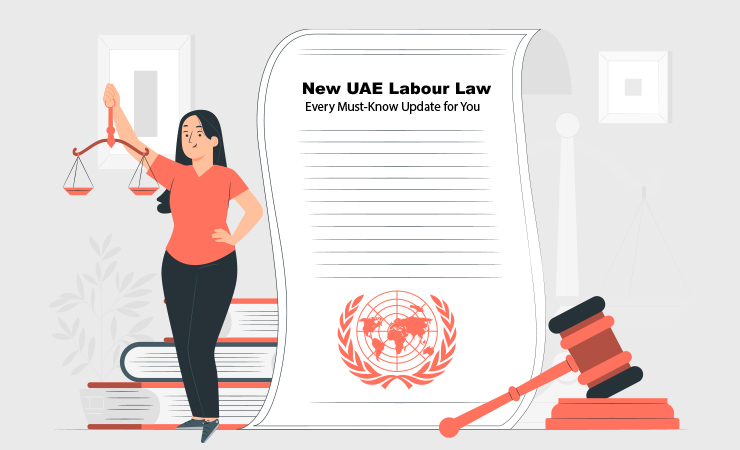- Nissan
- Toyota
- Honda
- Mitsubishi
- Ford
- Other
New UAE Labour Law – Every Must-Know Update for You

Up until 2nd February 2022, the employment sector of the UAE was functioning on Federal Law (8), 1980. Effective from the aforementioned date, the new UAE labour law has replaced the old one, introducing many interesting changes to the sector. The new labour law of the UAE – Federal Decree-Law No 33 of 2021, drafted in November 2021 is now in effect and will apply to all sectors except Dubai International Financial Center and Abu Dhabi Global Market. The implementation of this new law may mean a lot to you as an employee as well as an employer. Let’s uncover every update mentioned in the new federal labour law.
More Flexible Work Permits
UAE is already known for its flexible work options and for providing ideal market situations to flourish one’s business. New UAE labour law seeks to further enhance these qualities by introducing a new system to categorise work permits. The new UAE labour law will introduce 12 categories of work permits. These will allow greater flexibility of contractual work for both the employers and the employees. The 12 categories of work permit that the new UAE labour law introduces are:
- One Mission Work Permit: Applies to employees recruited for a specific project and for a specific time.
- Temporary Work Permit: Allows hiring for a particular duration, for any number of projects.
- Part-time Work Permit: Holders of this permit can work for multiple employers for a few hours or so.
- Juvenile Work Permit: Allows 15 years old or older minors to work in the UAE.
- Student Training Permit: Permits employers to hire students younger than 15 years of age for training purposes. A healthy work environment shall be maintained.
- UAE/GCC Nationals Permit
- Golden Visa Holder Work Permit
- National Trainee Permit: To train UAE nationals.
- Freelance Work Permit: Allows self-sponsored ex-pats to work without any contractual obligations with one or multiple employers.
- Transfer of Employment Work Permit: Allows employees to transfer from one work facility to another, both of which fall under the regulations of the new UAE labour law.
- Permit to Hire People Outside of UAE
- Work Permit for Family-Sponsored Expats
Limited Employment Contracts
Expats working in the UAE could hold unlimited contract jobs until now. The new UAE labour law demolishes this clause and makes all working contracts limited, going up to a maximum of 3 years at a time. The contracts can be renewed as many times as the employer and the employee mutually agree to do so. Unlimited work contracts of the existing employees must also be re-drafted and switched to limited contracts. The deadline to re-draft all old contracts is February 1st, 2023.
Leave Policies with New Categories of Leaves
The new UAE labour law brings about several new categories of leaves intended to bring a better work-life balance for all employees. These new categories of leaves include the following:
- Mourning Leaves: 3 to 5-day leave of absence period is allowed of the employees in case of demise of a relative. 5 leaves are allowed upon the death of the spouse and 3 days of leave are allowed in case of death of parents, siblings, children, grandchildren and/or grandparents.
- Paternity Leaves: This type of special leave allows the father to avail 5 leaves upon the birth of his child. These leaves can be taken any time during the next months after the birth. Employees can take these leaves consecutively or scatter them.
- Study leave: Any employee who has completed 2 years of service with a company can take up to 10 leaves for study or exam purposes.
- Holiday Leaves: Holidays are to be taken in the same year. In case of termination, the holiday pay reimbursement amount is to be calculated based on the basic salary of the employee.
Paid Maternity Leaves
Maternity leaves allowed for all female employees a set of 45 leaves which will be fully paid and 15 additional days of leave which will be half-paid. Maternity leaves can be taken for stillborn babies as well as on the death of a new-born. An additional 45-day leave will be given if the employee suffers from any post-pregnancy complication or illness.
Changed Work Modules for Increased Productivity
There six new work models are being introduced in the new UAE labour law. These include remote working, shared job model, full-time work, part-time work, temporary jobs, and flexible work hours. This allows employees to have better flexibility when working. In addition to these new work models, the new regulations also allow full-time employees to get additional part-time jobs as long as they do not exceed maximum working hours. The six new work models are designed to ensure better productivity and flexibility of operations for both employers and employees.
Non-Competition Law
The clause that prohibits current employees from working with another competitor of the employer can now be included in the job contract. However, the no-competition clause is only applicable for two after the employee leaves their current job. Some posts exempted from this particular regulation. However, that list is yet to come out. Other restrictions of the same nature, like non-poaching of clients and employees, have not been addressed in the amendments of the new UAE labour law.
Work Discrimination, Harassment, Bullying and Forced Labour
The new UAE labour law also focuses on creating a healthy work environment for all employees. In this light, strict rules prohibiting any form of discrimination in the workplace against employees have been prohibited. This includes discrimination against colour, sex, race, country of origin, religion and social origin. In addition to this, all forms of workplace harassment, bullying and forced labour have also been prohibited for all.
Equal Pay for Women
Continuing with the no discrimination clause, equal pay for equal work is another change that the new UAE labour law will introduce. This means women will face no discrimination in terms of salaries. Women performing the same work as men or work of equal value must be granted the same pay as men as per the new labour law of the UAE.
Termination During Probation
Up until now, employers were not required to send a prior notice to terminate employees still on probation. Now, all employers must send a 14-day notice for the termination of probationary employees. If an employee in probation period wants to leave, they must offer at least a 1-month long notice period. In case the employee needs to terminate the employment and leave the UAE, they can give a 14-day notice. If the said employee comes back to the UAE on a work visa within the next three months and joins some other employers, the current employer must reimburse the previous one for loss of resource.
Termination of Permanent Employees
Permanent employees need to serve a minimum 30-day notice. However, the maximum time for the notice period is now capped at 90 days. There was no capping of such kind before which allowed employers to keep senior employees like executives on a notice of 6 to 12 months. The new capping on notice period in the new UAE labour law will prove to be a huge challenge for employers. Employees on notice period are allowed to take one leave for searching job.
Notice period regulations will be different for employees who are currently working under unlimited job contracts. Any employee who has worked less than 5 years for an employer is required to give a minimum 30-day long notice. Employees with more than 5 years of service in their tenure must give at least 60 days’ notice. A 90-day notice period will apply if the employee has 10-year-long or longer tenure. Two written warnings and a written investigation shall be conducted before an employer can dismiss the services of an employee based on unsatisfactory work performance.
Termination without Notice
Termination without notice can be done on three grounds – if the employer fails to comply with their duties and obligations; if the employee has notified MHRE of a grave workplace issue and the employer fails to address it; and, if there is a case of harassment, violence, or discrimination of any kind. The employee must notify MHRE of the harassment/discrimination five days before leaving the organisation.
Entitlement of the Employees
All employers are required to settle all dues of their employees within 14 days of them leaving the organisation. In case of the demise of an employee, the employer must settle the entitlements within 10 days of the death. The entitlements of the deceased employee can go to the spouse, parents or children of the employee.
Disciplinary Changes
In case an employee is found to violate company rules or is suspected of foul play, they can be suspended for 30 days with half pay. The suspension period can be used to conduct an investigation. If the employee is found to be innocent, the withheld amount of salary must be reimbursed immediately along with other on-job benefits.
Gratuity Calculations
Gratuity calculations are to be made as per the total number of working days of an employee under the new UAE labour law. End-of-service gratuity is to be given upon summary dismissal of the employees. It does not apply in case the employee resigns.
Exemption of Legal Fee for Lawsuits
This change allows the employees to file lawsuits, petitions and enforcement orders against their employers without bearing any expenses of the same. However, the legal claim filed must not increase AED 100,000 for this rule to apply. Employers are also required to bear every cost related to the recruitment of an employee and must not take it out of employees in any way, directly or indirectly.
Additional Small but Important Updates
- A concise work week can be given to private-sector employees as the public sector in Dubai, Abu Dhabi and Sharjah has already adapted the same. However, this is completely up to the employer as of now.
- Overtime is limited to 144 hours in three weeks for all employees. The reimbursement must be calculated as per basic salary.
- Compensatory leave policies are to be added to the contract of the employees.
- All other suggested amendments must be applied before February 1st, 2023.
Actions and Breach of the New Labour Law
Organisations may face up to AED 1,000,000 fine if any of the new UAE labour laws are breached. This fine could be multiplied further if the breach of laws affects several employees in the organisation. All employers are required to communicate the new UAE labour laws to their employees properly.
The new labour laws of the UAE have certainly introduced some very unexpected changes in the employment sector of the emirates. While many of these laws will provide much-needed solace to the employees, some will prove troublesome for the employers. For example, the notice period capping clause which limits the maximum days of notice to 90. Most of these laws are designed to re-shape UAE’s work culture into a more attractive scope for current and potential employees, from both inside and outside of the country. While the laws have been in effect since February 2nd,2022, it is yet to be seen how well they perform in the long run.
- Latest News & Update










